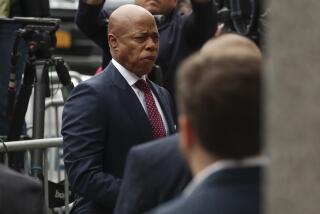Lewis Pleads Innocent to Forgery of Reagan Name
- Share via
SACRAMENTO — Assemblyman John R. Lewis (R-Orange) pleaded not guilty Tuesday to a single felony charge of forging former President Ronald Reagan’s name on campaign letters mailed to thousands of California voters in 1986.
Lewis’ plea, in proceedings that took less than a minute, came after nearly three months of legal maneuvering by his lawyers, who had won several postponements of the arraignment while they sought dismissal of the grand jury indictment against him.
Although those attempts continue, Sacramento County Superior Court Judge James I. Morris ordered Lewis, who was indicted Feb. 6 by the Sacramento County Grand Jury, to appear Tuesday morning to enter his plea.
Lewis stood next to his lawyer, Clyde M. Blackmon, as Blackmon told Morris that Lewis intended to plead not guilty. Morris then asked Lewis if that was what he wanted to do.
“Yes,” Lewis replied.
Morris ordered Lewis to return to court on May 10 for a decision on whether the case will proceed to a post-indictment hearing or go directly to trial based on the evidence presented in the indictment.
At a post-indictment hearing, Lewis’ lawyers would be able to cross-examine the witnesses whose grand jury testimony led to the indictment. A judge would then decide if there was reasonable cause to proceed to a full trial.
Lewis, who guided Assembly Republican campaign strategy in 1986, has never denied that he ordered staff members and direct mail consultants to send the phony presidential endorsement letters. The letters were mailed in six Assembly races even though the White House had denied the Assembly Republicans permission to use Reagan’s name, according to grand jury testimony.
Lewis has portrayed the case as a political vendetta on the part of Atty. Gen. John K. Van de Kamp, a Democrat who is running for governor. Lewis and his allies have accused Van de Kamp of ignoring several similar cases of phony signatures on political endorsement letters.
And Lewis’ lawyers, in legal motions, have argued that the state’s forgery laws would not apply to the case. They have said that the crime of forgery requires an intent to defraud someone of money or property, and that Lewis, even if he did order the phony endorsement letters mailed, had no such criminal intent.
Judge Morris rejected that logic in a ruling last month. Instead, he accepted the prosecution’s argument that Lewis could be convicted of forgery if he is found to have defrauded voters of their “voting franchise right.” The issue has been appealed to the 3rd District Court of Appeal.
Deputy Atty. Gen. W. Scott Thorpe, the chief prosecutor in the case, said after Tuesday’s hearing that Lewis’ plea, and next week’s scheduled decision on how the case will proceed, represent welcomed “progress” in the matter.
“We want the case to go to trial as soon as possible,” Thorpe said.
Blackmon said he does not believe the trial would begin before September.
More to Read
Get the L.A. Times Politics newsletter
Deeply reported insights into legislation, politics and policy from Sacramento, Washington and beyond. In your inbox twice per week.
You may occasionally receive promotional content from the Los Angeles Times.










